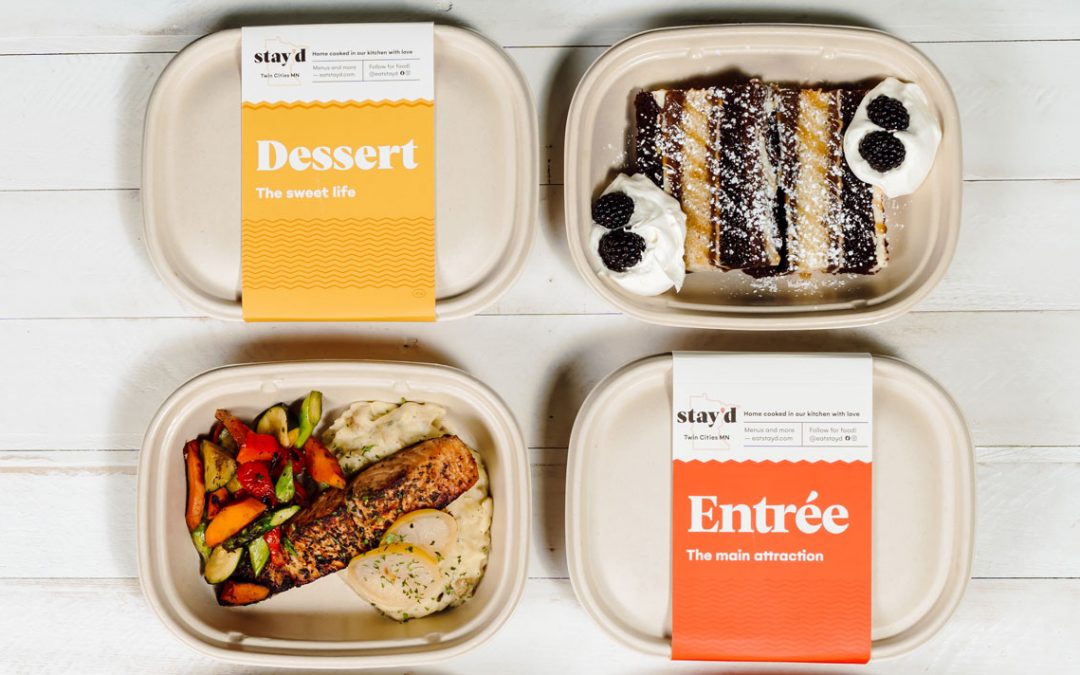High-touch, hospitality-minded restaurant folks are more than ready to bring people back into restaurants. But the founders behind delivery-only virtual restaurant brand Stay’d are looking to bring some of that high-touch hospitality to the delivery experience.
Compared to a great restaurant, delivery can be a bit of a hollow experience no matter how good the food is. As many restaurant operators lament, it’s an experience largely dictated by whoever shows up to take the delivery.
“I don’t necessarily like not controlling the whole process,” said Jeff Castillo, CEO of Maadaadizi investments, parent company of Stay’d.
He said the company, which oversees several restaurants and hotel properties for the Mille Lacs Band of Ojibwe in Minnesota, was exploring delivery prior to the pandemic, and had their gripes with the process. At very low order volumes, he said, addressing those concerns stayed on the proverbial back burner.
“We thought, we’ll get to that when we get to it. But COVID strikes and now it’s our only source of business,” said Castillo. “We were thinking about it, if we were to create a concept with delivery and takeout in mind, what would we want to do? We’d want food that inspires some kind of connection and put the importance of a meal and gathering with one another. We weren’t able to do that, so it was how to do that at home and how can we put some hospitality touches back into something that got really disconnected?”
He said the chief goal for Stay’d was to use the various properties under management to send out delivery-only food with that connection in mind. It was all designed to feel like a restaurant, getting people to share bites of entrees and big sides for the whole group. Things like shrimp scampi and gouda mac, brisket and stout shepherd’s pie and gin-cured salmon were all developed with delivery travel times in mind. Much of the menu is also locally sourced, something Stay’d highlights much like the host restaurants do on their menus.
Jesse Keaveny, a marketing executive at Maadaadizi and head of brand for Stay’d, said wrapping that food in high-touch hospitality first meant a lot of re-thinking the whole delivery experience.
“We were really deliberate about what can we and what can’t we solve for. We knew there was a big opportunity to elevate the whole experience, and a benefit to start from scratch as a delivery-first and delivery-only brand,” said Keaveny. “We’re not taking an existing menu and throwing it in a bag and dropping it off. That’s where the disconnected became really prominent. All of a sudden the experience you have with a restaurant you like, isn’t there.”
For Stay’d, that meant sourcing a branded bag consumers could reuse. It also included limiting the delivery radius around the host kitchens from which the virtual brand operates so that food arrived in great shape. Keaveny said there was a lot of thought and focus on the individual packing, too, so the development team was especially thoughtful about sustainability and upscaling that bag-opening moment.
“We wanted to be very thoughtful about the impact of packaging, there’s a lot of materials and potential waste. We sourced these plant-fiber containers and tested with our product to make sure they held heat. They’re all compostable, that comes at a premium to provide that container,” said Keaveny, who sought to clarify who ordered what, too. “To do a better job we made custom sleeves, we divided those between entrees and desert and our team will write on each one or use a sharpie on a box. We were very thoughtful about that, it kind of eases the process.”
We’ve all been there, opening up a delivery order to play hide-and-seek with your entrée. He said the sleeves speed that along and add a personal touch. It’s the same with hand-written thank-you cards in the bag. That, Castillo said, could be where the market is heading—back toward high-touch service.
“Squarespace acquired Tock, I think that lends a touch of precedence that injecting some hospitably and having hospitality-minded folks spearheading this is wise,” said Castillo. “I think the market indicated that with that acquisition.”
In the first few weeks of service, he said sales have been pretty good, but they’re still getting the word out. Keaveny said they’re doing very localized marketing in their delivery radius around the initial location in St. Paul. The team has plans to expand to the handful of other properties under Maadaadizi that includes hotels and restaurants.
Those not insignificant holdings and ample capital behind them helped the team really think through the offering for not just the COVID era, but to thrive among the higher level of delivery orders going forward.
“It took some time to develop and we wanted to be thoughtful about how it developed and when it launched. For longer-term sustainability, it wasn’t a survival thing, but more it was we have some time to think about what it should look like,” said Castillo. “So, when things get better, let’s make sure we have a good, quality concept.”


